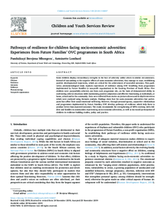childrens_living_arrangement
children_living_without_bio
Displaying 111 - 120 of 336
The aim of this article is to discuss the social justice implications for educational psychologists working with orphans and vulnerable children (OVC) who comprise 3.7 million of the population in South Africa.
This qualitative, phenomenological study explores experiences of resilience among OVC benefiting from programmes implemented by Future Families (a non-profit organisation) in the Gauteng Province of South Africa.
This paper presents four case studies of participatory educational research in Africa, including the lived experiences of orphaned children and conceptions of education quality in South Africa.
This paper examines all policy and laws related to families in the South, West, East and Central regions of sub-Saharan Africa.
Through a thematic content analysis of qualitative interviews with members of migrants’ families, this article illustrates that in the context of internal labour migration, family responsibilities shift in ways that make unemployed grandmothers in South Africa who do not receive the Old Age Grant vulnerable.
The special issue of Emerging Adulthood titled “Care-Leaving in Africa” is the first collection of essays on care-leaving by African scholars. This article, coauthored by scholars from North and South, argues in favor of North–South dialogue but highlights several challenges inherent in this, including the indigenizing and thus marginalizing of African experience and scholarship and divergent constructions of key social concepts.
The aim of this study was to assess the feasibility and acceptability of a home‐based intervention—Amagugu Asakhula—to promote nurturing interactions and healthy behaviours with the caregivers of preschool children.
The National Executive Committee of the South African National Association of Child Care Workers(NACCW) and the Board of Governors of CYC-Net have announced details of the 22nd NACCW Biennial Conference and the 4th CYC-Net World Conference to be held in Durban, South Africa from 2-4 July 2019.
This chapter from the boom Child Justice Administration in Africa examines the development of the child justice system in South Africa. The empirical findings in this book revealed the models put in place for alternative care of children in need of care and protection, which the author believes were hindered by inadequate budgetary allocations and could have been recorded in the administration of child justice in South Africa.
This research investigated the psychosocial-support provision for learners from child-headed households (CHHs) in five public high schools in South Africa.


